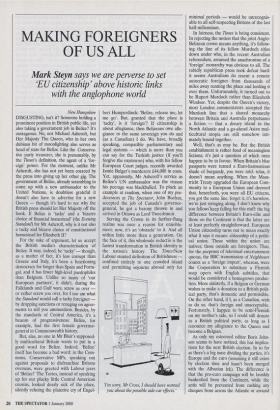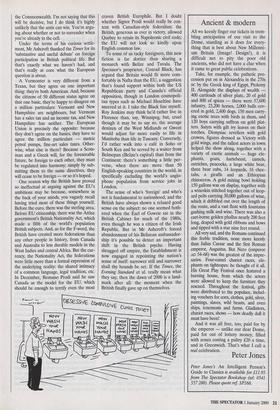MAKING FOREIGNERS OF US ALL
Mark Steyn says we are perverse to set EU citizenship' above historic links with the anglophone world
New Hampshire DISGUSTING, isn't it? Someone holding a prominent position in British public life, yet also taking a government job in Belize? It's outrageous. No, not Michael Ashcroft, but Her Majesty The Queen, who in her own dubious bit of moonlighting also serves as head of state for Belize. Like the Conserva- tive party treasurer, she is presumably, by the Times's definition, the agent of a 'for- eign' power. For the moment, unlike Mr Ashcroft, she has not yet been coerced by the press into giving up her other gig. The government of Belize, already scrambling to come up with a new ambassador to the United Nations, is doubtless grateful it doesn't also have to advertise for a new Queen — though it's hard to see why the British press should let Her Majesty off the hook. If Belize is 'tacky' and a 'bizarre choice of financial homestead' (the Evening Standard) for Mr Ashcroft, why is it not also a tacky and bizarre choice of constitutional homestead for Elizabeth II?
For the sake of argument, let us accept the British media's characterisation of Belize. It may, indeed, be 'tacky' — though, as a matter of fact, it's less corrupt than Greece and Italy, it's been a functioning democracy for longer than Spain and Portu- gal, and it has fewer high-level paedophiles than Belgium. Unlike so many of 'our European partners', it didn't, during the Falklands and Gulf wars, screw us over or rather screw you over, for I too am what the Standard would call a tacky foreigner by dropping sanctions or reneging on agree- ments to sell you ammunition. Besides, by the standards of Central America, it's a beacon of progressiveness: Belize, for example, had the first female governor- general in Commonwealth history.
But, alas, no one in Mr Blair's supposed- ly multicultural Britain wants to put in a good word for Belize. Indeed, 'Belize' itself has become a bad word: in the Com- mons, Conservative MPs, speaking out against proposals to disfranchise Britons overseas, were greeted with Labour jeers of 'Belize!' The Tories, instead of speaking up for our plucky little Central American cousins, looked dearly sick of the place, silently echoing the plaintive cry of Engel- bert Humperdinck: 'Belize, release me, let me go'. But, granted that the place is `tacky', is it 'foreign'? If citizenship is about allegiance, then Belizeans owe alle- giance to the same sovereign you do and (as a Canadian) I do. We have, broadly speaking, compatible parliamentary and legal systems — which is more than you can say for the Turkish justice (if you'll forgive the oxymoron) who, with his fellow European Court judges, recently awarded Jamie Bulger's murderers £44,000 in costs. Yet, apparently, Mr Ashcroft's service as Belize's UN ambassador was the reason his peerage was blackballed. To pluck an example at random, when one of my pre- decessors at The Spectator, John Buchan, accepted the job of Canada's governor- general, he got a barony thrown in and arrived in Ottawa as Lord Tweedsmuir.
Serving the Crown in its further-flung realms was once a reason for ennoble- ment; now, it's an 'obstacle' to it. And all within little more than a generation. On the face of it, this wholesale reductio is the fastest transformation in British identity in the nation's history. The Times(New Labour stunted definition of Britishness — confined entirely to one crowded island and permitting sojourns abroad only for Tm sorry, Mr Cross, I should have warned you about the possible side-car effects.' minimal periods — would be unrecognis- able to all self-respecting Britons of the last h alf-millennium.
In fairness, the Times is being consistent. In rejecting the notion that the joint Anglo- Belizean crown means anything, it's follow- ing the line of its fellow Murdoch titles down under who, in the recent Australian referendum, assumed the anachronism of a `foreign' monarchy was obvious to all. The rabidly republican press took defeat hard: it seems Australians do resent a remote autocratic foreigner from thousands of miles away running the place and lording it over them. Unfortunately, it turned out to be Rupert Murdoch rather than Elizabeth Windsor. Yet, despite the Queen's victory, most London commentators accepted the Murdoch line that a shared monarchy between Britain and Australia perpetuates a fiction — that a dreary island in the North Atlantic and a go-ahead Asian mul- ticultural utopia are still somehow inti- mately bound together.
Well, that's as may be. But the British establishment is rather fond of meaningless fictions; it's just a question of which ones happen to be in favour. When Britain's blue passports were turned a Euro-harmonious shade of burgundy, you were told: relax, it doesn't mean anything. When the Maas- tricht Treaty upgraded the European Com- munity to a European Union and decreed that, henceforth, you were all EU citizens, you got the same line: forget it, it's harmless, we're just stringing along. I don't know why you fellows'keep falling for this stuff: the big difference between Britain's Euro-elite and those on the Continent is that the latter are at least perfectly straightforward. European Union citizenship turns out to mean exactly what it says it means: citizenship of a politi- cal union. Those within the union are natives; those outside are foreigners. Thus, for the purposes of televisual entertainment quotas, the BBC transmission of Neighbours counts as a 'foreign import', whereas, were the Corporation to substitute a Flemish soap opera with English subtitles, that would be considered a homegrown produc- tion. More sinisterly, if a Belgian or German wishes to make a donation to a British polit- ical party, that's domestic and permissible. On the other hand, if I, as a Canadian, wish to do so, that's foreign and unacceptable. Fortunately, I happen to be semi-Flemish on my mother's side, so I could still donate to a British political party, as long as I renounce my allegiance to the Queen and become a Belgian.
As only my esteemed editor Boris John- son seems to have noticed, this has implica- tions for the next British election. In so far as there's a big issue dividing the parties, it's Europe and the euro (assuming it still exists by election time and hasn't been merged with the Albanian lek). The difference is that the pro-euro campaign will be lavishly bankrolled from the Continent, while the antis will be prevented from cashing any cheques from across the Atlantic or around the Commonwealth. I'm not saying that this will be decisive, but I do think it's highly unlikely that the antis can win. You're argu- ing about whether or not to surrender when you're already in the cell.
Under the terms of his curious settle- ment, Mr Ashcroft thanked the Times for its `substantive and useful debate' on foreign participation in British political life. But that's exactly what we haven't had, and that's really at core what the European question is about.
A Vermonter is very different from a Texan, but they agree on one important thing: they're both American. And, because the citizens of 50 different states agree on that one basic, they're happy to disagree on a million particulars: Vermont and New Hampshire are neighbours, but Vermont has a sales tax and an income tax, and New Hampshire has neither. The European Union is precisely the opposite: because they don't agree on the basics, they have to agree the million particulars — metric petrol pumps, fine-art sales taxes. Other- wise, what else is there? Because a Scots- man and a Greek will, for the foreseeable future, be foreign to each other, they must be regulated into harmony; simply by sub- mitting them to the same directives, they will cease to be foreign — or so it's hoped.
One reason why the British have proved so ineffectual at arguing against the EU's ambitions may be because, somewhere in the back of your minds, you vaguely recall having tried most of these things yourself. Before the euro, there was the sterling area. Before EU citizenship, there was the Attlee government's British Nationality Act, which made a fifth of the world's population British subjects. And, as for the F-word, the British have created more federations than any other people in history, from Canada and Australia to less durable models in the West Indies and central Africa. But the cur- rency, the Nationality Act, the federations were little more than a formal expression of the underlying reality: the shared intimacy of a common language, legal tradition, etc. In December, Romano Prodi said he saw Canada as the model for the EU, which should be enough to terrify even the most craven British Europhile. But I doubt whether Signor Prodi would really be con- tent with Canadian-style federalism: the British, generous as ever in victory, allowed Quebec to retain its Napoleonic civil code; the EU will not look so kindly upon English common law.
To some of us tacky foreigners, this new fiction is far dottier than sharing a monarch with Belize and Tuvalu. The Spectator's proprietor, Conrad Black, has argued that Britain would fit more com- fortably in Nafta than the EU, a suggestion that's found support within both the US Republican party and Canada's official opposition, though in London cosmopoli- tan types such as Michael Heseltine have sneered at it. I take the Black line myself. Roy Jenkins may think he'd rather live in Florence than, say, Winnipeg, but, cruel though it may be to say so, the average denizen of the West Midlands or Gwent would adjust far more easily to life in Manitoba than life in Tuscany. Conversely, I'd rather walk into a café in Soho or South Ken and be served by a waiter from Belmopan (Belize's capital) than from the Continent: there's something a little per- verse, when there are more than 50 English-speaking countries in the world, in specifically excluding the world's anglo- phone population from service jobs in London.
The sense of who's 'foreign' and who's not is fundamental to nationhood, and the British have always shown a relaxed good sense on the subject: no one seemed both- ered when the Earl of Gowrie sat in the British Cabinet for much of the 1980s, even though he was a citizen of the Irish Republic. But in Mr Ashcroft's forced abandonment of his Belizean ambassador- ship it's possible to detect an important shift in the British psyche. Having shrugged off empire, the Establishment is now engaged in repointing the nation's sense of itself: narrower still and narrower shall thy bounds be set. If the Times, the Evening Standard et al. really mean what they say, then the dawn of 2000 is a land- mark after all: the moment when the British finally gave up on themselves.



















































 Previous page
Previous page